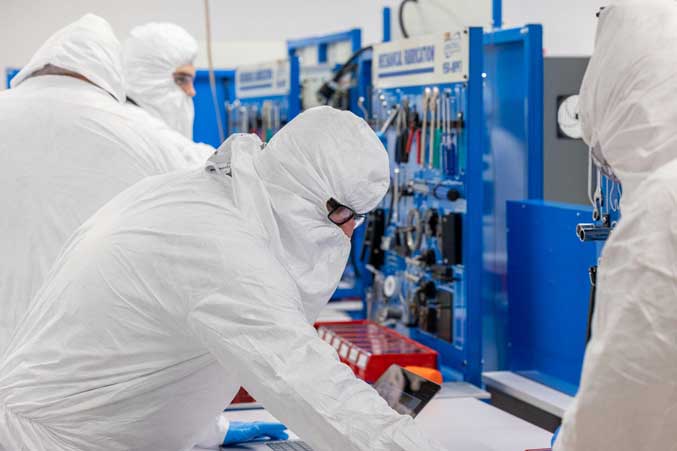TSMC Partners With Maricopa Community Colleges to Prepare Students for Hire
Taiwan Semiconductor Manufacturing Company is bringing thousands of jobs to Phoenix with its new chip facility under construction in North Phoenix. And, with a new fast-track program designed through a partnership with Maricopa Community Colleges, a path to a new career in the semiconductor industry is even more within reach.
With Maricopa County emerging as a semiconductor hub with Intel in the East Valley and TSMC in the North Valley, industry leaders saw the partnership as an opportunity to positively impact the growing industry’s footprint in Arizona.
In as little as two weeks and 40 total hours, students enrolled in the Semiconductor Quick Start training program can become equipped with the skills and knowledge needed to fulfill manufacturing technician positions within the semiconductor industry.
The program teaches foundational skills including performing industrial electrical, reading schematics, identifying and using hand tools, following safety protocols for clean rooms and Personal Protective Equipment, and using vacuum systems. Students will also learn semiconductor manufacturing concepts and processes, Model Based Problem Solving and how to apply it, as well as lean manufacturing, Paula Livingston, Interim Vice President Academic Affairs at Estrella Mountain Community College, told Valley Vibe.
“These critical skills, knowledge, and abilities were identified through our collaboration with TSMC to prepare students for jobs like manufacturing technician and other positions that are responsible for helping to monitor wafer manufacturing processes, execute process analysis, and create collaborative solutions,” Livingston said.
The program is offered in both the fall and spring semesters at Estrella Mountain Community College, Chandler-Gilbert Community College and Mesa Community College.
Upon completion of the course, students earn the nationally recognized NIMS Semiconductor Certification, along with a guaranteed interview for a manufacturing technician position at TSMC.
“Having TSMC guarantee interviews is a critical indicator of their support for this program and the experience students are getting,” Livingston said.
“Our partnership with the Maricopa Community Colleges enables us to create a sustainable pipeline that serves our industry’s short and long-term technician needs,” said TSMC’s Head of Human Resources, Scott Holman.
The program was first launched in July 2022, and several graduates from the program have been hired or are in the interview process with TSMC, Holman said.

Holman said with the recent announcement of a second phase plant expansion in Arizona, TSMC anticipates the company’s operations to be supported by more than 4,000 employees. “With that, we expect as we ramp up operations for both of our fabs, there are still many technicians to be hired,” he told Valley Vibe.
Phoenix native Rylee Pruitt is one the first graduates of the Quick Start Program at Estrella Mountain Community College to land a job at TSMC as a manufacturing technician. Pruitt, who formerly served in the Air Force Reserves, said while the semiconductor industry was unfamiliar to her, she was drawn to the culture and values that TSMC represents.
“I can see myself building a career there,” said Pruitt, who completed the course in summer of 2022 and has been with TSMC since September 2022.
While TSMC did not specify the pay range, according to Maricopa County Colleges website, starting pay for an entry-level technician role is $20–$25 per hour. As of this writing, TSMC’s job postings on its website showed at least a dozen open manufacturing technician positions at its Phoenix plant.
Looking forward, Livingston said Maricopa Colleges plans to expand the partnership with TSMC and others in the semiconductor manufacturing industry to ensure pathways for students to move from entry-level positions to higher positions.
A wait list has formed for Fall 2023 classes. To learn more about the program and course schedule, visit https://info.maricopacorporate.com/semiconductor.
By Karen Goveia

